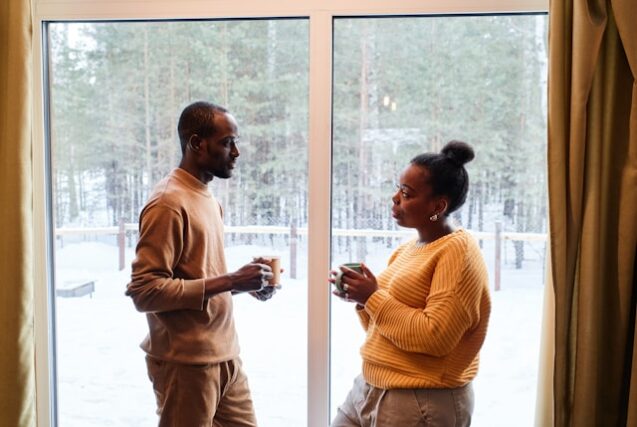Growth doesn’t always arrive with a glow-up or a sudden epiphany.

Sometimes it shows up as discomfort, disconnection, or straight-up awkwardness, which makes it hard to recognise or appreciate. If you’re becoming a new version of yourself, these changes might feel weird at first, but they’re all part of the process. You’ll be a much better person in the long run because of it, not to mention much happier, to boot.
1. You feel out of place in conversations you used to enjoy.

Suddenly, the gossip doesn’t land. The jokes feel stale. The back-and-forth that used to energise you now feels like background noise. It’s not because you’re better than anyone; it’s because your inner world is changing. As you grow, your values inevitably change. Your attention sharpens. And small talk with people you once clicked with starts to feel like playing an old role that no longer fits. That mismatch can be lonely, but it’s also a sign you’re evolving.
2. You don’t rush to explain yourself anymore, and it feels selfish.

Where you used to over-explain or justify your choices, now you just say no, or not today, or “this is what I need”—and leave it there. At first, that directness can feel rude or abrupt. However, this is what boundaries sound like when they’re new. It’s not selfishness, it’s clarity. The discomfort is just your old programming trying to make peace with your new self-respect.
3. Things you used to tolerate start feeling unbearable.

The little digs from that one friend. The job that drains you. The way you’ve been sidelining your own needs for the sake of harmony—it all becomes harder to ignore. Growth wakes you up, and once you’ve seen what peace could look like, your tolerance for chaos drops fast. That irritability isn’t regression—it’s your nervous system asking for something different.
4. You feel guilty for needing more.

More rest, more space, more depth, more purpose. You want things that your old life didn’t require, and you might even feel spoiled for wanting them. However, needing more doesn’t make you ungrateful. It means you’ve grown beyond your previous limits. Guilt is often the first emotion that shows up when your self-worth expands. Let it pass through without letting it shrink you.
5. Your old coping mechanisms stop working.

The scrolling, the busy-ness, the emotional detachment—whatever once kept you safe starts to feel off. You can’t unsee how those habits dull your joy or block real healing. This is when growth gets messy. Letting go of what numbed you doesn’t mean you know how to comfort yourself yet, but that awkward in-between is where emotional strength is built.
6. You feel disconnected from people who still see the “old you.”

They still speak to the version of you who stayed quiet, laughed off discomfort, or said yes to everything. And you’re no longer sure how to respond, because you’re not that person anymore. That kind of disconnection can feel disloyal, or even painful. However, it’s not about cutting people off. It’s about giving yourself permission to keep growing, even if other people are slower to catch up.
7. You outgrow environments that once felt safe.

It might be a job, a community, or even your own home. The routines that once gave you structure start to feel too small, too familiar, too tight. That doesn’t mean those places were wrong. It just means they carried you as far as they could. When growth kicks in, safety sometimes gives way to restlessness, and that’s not a sign to run. It’s a sign to listen.
8. You feel awkward about celebrating yourself.

You achieve something, set a boundary, do something brave, and then immediately downplay it. Complimenting yourself still feels unnatural, maybe even cringey. That’s because self-celebration wasn’t part of the old version of you. But it’s essential now. Learn to sit in your small wins, even if your voice shakes while saying, “I’m proud of myself.”
9. You second-guess your new standards.

You walk away from situations that feel wrong, but you still wonder if you were too sensitive. You stop chasing approval, but a part of you misses the high of being liked. The uncertainty is normal. When you raise your standards, your nervous system still remembers what it felt like to settle. That tug-of-war will quiet down the longer you choose what actually aligns.
10. You need more time to yourself than you used to.

Growth takes energy. And not the kind you spend—it’s the kind you protect. You start craving quiet, reflection, or long stretches of time alone to process what’s changing inside you. People might worry. You might worry. But needing solitude isn’t withdrawal. It’s integration. It’s how your mind catches up with your heart.
11. Your relationship with productivity changes.

You stop idolising being constantly busy. You start questioning whether achieving more actually makes you feel better. Rest starts to feel less like a luxury and more like a non-negotiable. That change can feel disorienting, especially if your worth was tied to performance. However, growth asks you to value presence over pressure. That’s not laziness, it’s alignment.
12. You no longer fit inside your old story.

The identity you clung to—people-pleaser, fixer, perfectionist, background character—it starts to crumble. You feel a little lost, like you’re walking away from something with no map of where you’re going next. That’s exactly what transformation feels like. You’re not broken. You’re just in between identities. Let the old version fall apart. What’s being built next will fit you better than anything you’ve known before.




